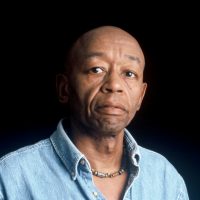

Roland L. Freeman is a Washington, DC-based photographer, whose work has been published widely and exhibited throughout the world, often along with quilts and other artifacts from his extensive collection of work by African Americans. He was the first photographer to be awarded a Young Humanist Fellowship by the National Endowment for the Humanities (1970), has received two Masters of Photography Visual Arts Fellowships from the National Endowment for the Arts (1982, 1991), the Living Legend Award for Distinguished Achievement in Photography from the National Black Arts Festival (1994), and an Honorary Doctorate in Humane Letters from Millsaps College (Jackson, MS; 1997). In October 2005, he delivered the plenary address to the Annual Meeting of the American Folklore Society in Atlanta, Georgia. Freeman was awarded the prestigious National Heritage Fellowship from the National Endowment for the Arts (2007).
Freeman, a native of Baltimore, Maryland, began his professional career in the 1960’s, photographing the Civil Rights Movement. After early photojournalism and commercial assignments, Freeman’s work has concentrated on photo-documentation related to cultural traditions. He has been a research associate for the Smithsonian Institution’s Center for Folklife and Cultural Heritage since 1972, a faculty member at several universities, and during 1997, the Eudora Welty Visiting Professor of Southern Studies at Millsaps College.
A major emphasis of Freeman’s work is his ongoing self-assigned project While There Is Still Time, a study of Black culture throughout the African Diaspora that uses the camera as a tool to research, document, and interpret the continuity of traditional African American folklife practices. This work is generally done in close collaboration with folklorists, historians, sociologists, and community activists, often in methodologically innovative ways that have been integral to his contributions to the work of photographers of his generation.
Freeman is the founder and president of The Group for Cultural Documentation (TGCD), a publicly supported tax-exempt organization established in 1991 to contribute to the strength of our nation through the understanding, preserving, and bridging of cultural identities and traditions. TGCD creates opportunities to support individuals and groups of diverse backgrounds and experiences in developing the understanding and communication skills necessary to function more effectively within the broader society.
Freeman’s major exhibits have been widely shown, including at the following venues: Baltimore Museum of Art, Baltimore, MD: Corcoran Gallery of Art, Washington, DC; Cultural Olympiad, 1996 Centennial Olympic Games, Atlanta, GA; International Center of Photography, New York, NY; Massachusetts Institute of Technology’s Creative Photography Gallery, Boston, MA; Mississippi Museum of Art, Jackson, MS; National Black Arts Festival, Atlanta, GA; National Art Gallery of Namibia, Windhoek, Namibia; National Museum, Lagos, Nigeria; Smithsonian Institution, Washington, DC, at the National Museum of American Art, the National Museum of American History, and the Smithsonian Folklife Festival on the National Mall; in South Africa, at the 2001World Court of Women Against War, For Peace, Cape Town, and the African Window Museum, Pretoria; The Oakland Museum, Oakland, CA; on USIS-sponsored tours in Europe to Denmark, Iceland and Portugal, and in Africa to Gabon, The Gambia, Liberia, Senegal and Tanzania; and by the US Department of State as part of the Art in Embassies Program in Burkina Faso, Russia, Rwanda, South Africa and Switzerland.
Books by Freeman include: Something To Keep You Warm: The Roland Freeman Collection of Black American Quilts from the Mississippi Heartland (Mississippi Department of Archives and History, 1979); Southern Roads/City Pavements: Photographs of Black Americans (International Center of Photography, New York, NY, 1981); Stand By Me: African American Expressive Culture in Philadelphia (Smithsonian Institution’s Office of Folklife Programs, 1989); The Arabbers of Baltimore (Tidewater Publishers, Centreville, MD, 1989); Margaret Walker’s ‘For My People’: A Tribute, Photographs by Roland L. Freeman (University Press of Mississippi, Jackson and London, 1992); A Communion of the Spirits: African-American Quilters, Preservers, and Their Stories (Rutledge Hill Press, Nashville, TN, 1996); and, The Mule Train: A Journey of Hope Remembered (Rutledge Hill Press, Nashville, TN, 1998). Each has been accompanied by a national/international touring exhibit. Fire in My Bones: Transcendence and the Holy Spirit in African American Gospel by Glenn Hinson, photographs by Roland L. Freeman (University of Pennsylvania, 2000), won the Chicago Folklore Prize, an international award recognizing the most significant book in the discipline for the year. His latest book is a collective biography entitled, A Tribute to Worth Long, Still on the Case: A Pioneer’s Continuing Commitment (The Group for Cultural Documentation and the Smithsonian Center for Folklife and Cultural Heritage, 2006).
Magazine work includes: London Sunday Times (England), Der Stern (Germany), Paris-Match (France), l’Express (France), Sfera (Italy), Quilt Japan (Japan), Time, Newsweek, Forbes, Nation’s Business, Inc., Human Behavior, Family Circle, Health Quest, Southern Cultures Journal, Essence, Black Enterprise, Emerge, The World and I, and National Geographic. Major photo essays have appeared in: The State of the Cities, A Report of the Commission on the Cities in the 70’s (Praeger New York, 1972); Children Out of School (Children’s Defense Fund, Washington, D.C., 1974); and, Neighborhoods: A Self-Help Sampler (Department of Housing and Urban Development, Washington, D.C., 1979).
Freeman’s work is in many permanent public collections, including: Art Institute of Chicago, Chicago, IL; Baltimore Museum of Art, Baltimore, MD; Bibliotheque Nationale, Paris, France; Corcoran Gallery of Art, Washington, DC; Detroit Institute of Art, Detroit, MI; High Museum of Art, Atlanta, GA; International Center of Photography, New York, NY; Mississippi Museum of Art, Jackson, MS; Museum of Modern Art, New York, NY; National Civil Rights Museum, Memphis, TN; Smithsonian Institution, Washington, DC (in the Anacostia Museum and Center for African American History and Culture; the National Museum of American Art; the National Museum of American History; the National Portrait Gallery; and the Center for Folklife and Cultural Heritage); University of Maryland, Baltimore County, Catonsville, MD; U.S. Library of Congress, in the Prints and Photographs Division and the National Folklife Center; University of California at Berkeley, Berkeley, CA. His work is also in more than 80 private collections.
Website
http://www.tgcd.org